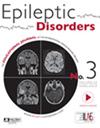Hypermotor temporal lobe epilepsy revisited-expanding the spectrum
Abstract
Objective
Typical semiology with associated 5As (Antecedent, Aura, Arrest, Automatisms, and Amnesia) is the prototypical seizure manifestation of temporal lobe epilepsy (TLE) in adults. However, patients with TLE can present with seizure phenomenology referred to as “hypermotor TLE” (HMS-TLE) which can mimic extratemporal focal epilepsy. We studied the clinico-electrographic, imaging profile, and surgical outcomes of drug-resistant HMS-TLE patients.
Methods
We analyzed the ictal signs and electroencephalography data of HMS-TLE patients who became seizure free following epilepsy surgery with a minimum follow-up of 1 year and compared them with patients with typical TLE (1:2 ratio). Hypermotor seizures were identified based on the presence of stereotyped ictal complex movements at seizure onset including body rocking, pelvic thrusting, and bimanual and bipedal movements with/without affective components.
Results
Out of 684 patients with drug-resistant TLE who underwent surgery during 2010–2020, 16 patients (2.34%) met criteria for HMS-TLE and were compared with 32 patients with typical TLE. Predominant “hypermotor” components included motor agitation, bicycling/kicking movements, body gyration followed by violent automatisms, and pelvic thrusting. Age at epilepsy onset, age at video telemetry recording, age at surgery, duration of epilepsy at surgery, gender distribution, and presence of aura were comparable between the two groups. History of febrile seizures (31.3% vs. 65.6%; p-value = .024), presence of hippocampal sclerosis on MRI, and histopathology (56.3% vs. 90.6%; p-value = .006 and 50% vs. 96.9%; p-value = .002, respectively) were lower, and temporal neocortical abnormalities on MRI (87.5% vs. 59.4%, p-value = .048), dysplasia on histopathological evaluation (25% vs. 0%, p-value = .003) were higher in HMS-TLE. HMS-TLE group had lower number of patients with focal-onset ictal patterns (37.5% vs. 90.6%, p-value = .0001).
Significance
Hypermotor seizures are rare in TLE, however it does not preclude non-invasive selection for surgery. Hence, physicians should be aware of this subtype of drug-resistant TLE as early intervention can have good surgical outcomes, akin to typical TLE.

 求助内容:
求助内容: 应助结果提醒方式:
应助结果提醒方式:


